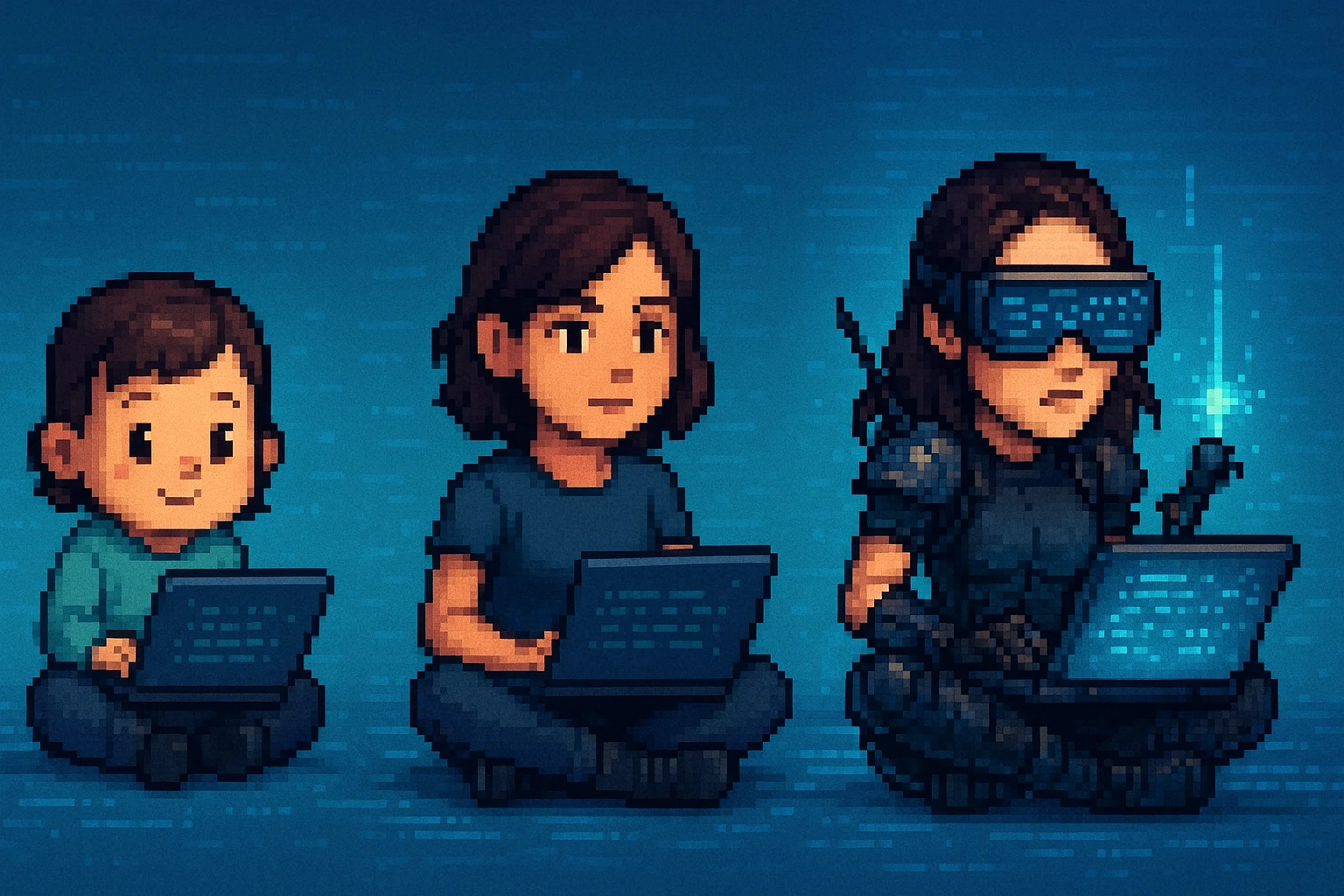
There’s been a significant amount of digital ink spilled recently trying to decide if Software Engineers as we know them are Going Away™. Much of it perhaps from folks who would really like to see the single biggest salary bill in their business drop a bit.
My personal take is somewhere in between “Software Engineers will look the same, but operate at a higher level of abstraction”1 and “The blanket is gonna be the same size but it’s getting dragged around right now. Some folks are gonna have cold toes.”
There’s definitely whole species of engineer whose extremities might be turning blue. Those who spend more time on ticket ceremonies or process-driven-blame-shifting that they do on delivering value. But you, you’re reading this, so I assume you’re keen for some evolutionary assistance (and to stay within the warm embrace of regular employment). In that case, here are four things to Get - aka unsolicited suggestions and practical advice to help you adapt.
0. Get on top of things

First, situational awareness. AI right now is like a bad Chris Pratt movie - the glaciers have melted just a lil’ bit and now we get to see if we’ve uncovered a species of immensely aggressive extraterrestials or some insanely useful new land where can build cool stuff2.
Our industry has always required a bit of idle web browsing and maybe some toy projects to stay up to date, but that’s the regular old plodding evolutionary pace. What we’re seeing now is the steep bit of a Punctuated Equilibrium graph - some bloody arthropod has gone and invented lungs and now threatens to take all the good spots unless we get our collective whatever-an-arthropod-has-instead-of-an-asses into gear.
For me, staying on top of things looks like:
- Joining every group chat, channel, seance etc with “AI” in the name
- Making time to read and watch everything that comes up or I get recommended in those channels (yes, even that two-hour deep dive! )
- Dipping into X where I can stand it (and liking every AI post possible in a desperate attempt to make the algorithm stop feeding me American politics)3
- Making time to experiment - git branches are cheap.
- Pushing each model or tool right to the edge: What happens if I give it a slightly bigger chunk of work, less guidance, more freedom (hello, YOLO mode?)
- Prompting Longer. Honestly, if you just do one thing on the list do this. Use the handy microphone button in your AI app of choice if you’re like me and enjoy a good yap. Most people just don’t seem to be giving these things enough context to go on.
1. Get Commercial

Now you know what’s going on, it’s time to start layering some adjacencies that are big boosts. One of the best skills you can learn in under an hour is how to read (and create) a P&L. Once you’ve got that, you can usually figure out which specific line you should be pushing up or driving down4.
Then, start asking “dumb deep” questions. A dumb question is “How do we make money?” - the answer is hopefully pretty obvious (“We sell hours of consultant time” or “We sell subscription software”). The trick is making it both dumb and deep: tweak it to “What do we need to do sell more hours?” or “How do we sell more subscription software?” Embrace your inner three-year-old and keep going until the askee gets frustrated and blurts out “Just because!”
Next, learn about funding, about rounds and equity and what a SAFE is, how the VC model actually works (not just “big bets that don’t pay off” - where do VCs get their money? How do they pay for their fancy offices?)
Then - important part - make some good decisions that make one of those P&L lines dip and/or dive. Congratulations, you’re now “so commercial” and “really business-minded.”5
This kind of high-level synthesis isn’t AI’s strongest suit (yet) and it’s one place where meat brains potentially retain their edge for a while. Plus, it’s kinda fun.
2. Get Broad

Look - the reality is that over the past decade-or-so software engineers have become a little bit like Emperor Kings just before everyone starts sharpening the guillotines. We relax on our thrones (hammocks)6 as the anoninted Technical Ones and wait for a Product Person to bring us little tidbits of ticket sliced up on a manageable-sized tray - mostly so we can fling them back in their face as “Insufficient. Acceptance. Criteria!” Management have had to constantly fan us with praise lest we point out that all the cold messages from recruiters we are NOT replying to.
Sadly, hammocks are not built to weather storms and this too cannot last. You really start to question why you’re filling your days washing someone’s feet when you can do their job to a rough approximation with a $400/month Claude subscription.
Designers are really good at this. In my experience they spend much more time understanding what the customer does all day and how the product fits into their workflow at a high level than they do fiddling with Figma. I’m not terrifed of CEOs, product managers or even CFOs replacing software engineers. I am watching those Designers 👀7.
Your defence? A good offence. Slice up your own tickets, talk to customers yourself, and build up “taste”8. Take their jobs before they take yours.
3. Get Things Done

Not exactly new advice, but sometimes lost in a sea of posts insisting “You Do Your Best Problem Solving in the Shower”. Sure, but eventually you need to make those thoughts real (or someone needs to get Tim Cook onto that waterproof MacBook).
Tools are multipliers and AI is a hefty one, but as every good RPG player knows, you still need high base damage. There’s no substitute for hours with your hands on the keyboard.
I’m not suggesting you go out and buy a desk sleeping bag, but there are concrete things you can do to increase your general productivity. I’m a fan of Productive Procrastination - knocking off fifty small tasks feels great and can prime you for the one big thing you actually need to do. There are tons of other tricks - but since you’re tricking yourself and your own psychology, it really is about finding your own vibe. The only mandatory rule? Invest some time trying a few Pomodoros or Todo.md workflows until you find a combo that vibes with you.
This is even more interesting when you layer on the current crop of async or background Agents. I used to invest in focused flow, but that all goes out the window when I can set Claude Code churning on something, go draft a blog post, answer some Slack messages, let the dog out and come back to a ding: “Code’s ready”.
Please write me a succinct conclusion that matches the style of my earlier paragraphs9
Evolve or Expire. Figure out the shape of the new world and stretch yourself out to get over awareness, commerical acumen breadth and execution - so even if a few bits fall off, you’ll still have somewhere warm to stand.
Who knows: There a bunch of really fun tail outcomes to all of this where we all swear off all technology and head back to the forests, or the Alien Luddites turn up to smash every last GPU lest we replace biological life.
In the meantime I’m really going to enjoy the ride up that Punctuated Equilibirum curve.
.png)




